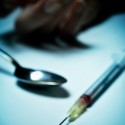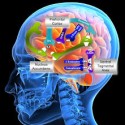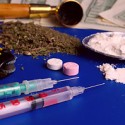Doctors helping doctors
GUELPH, ONT.
NICOLE VISSCHEDYK
The Canadian Press
“You walked into the office and sat down. Did it ever cross your mind that I wasn’t sober?”
Sitting in the quiet, bright office of a doctor, the question jarred me.
Dr. Graeme Cunningham is director of the addiction division at the Homewood Health Centre.
He answered his own question in his thick Scottish accent, “Of course it didn’t,” he said. “That’s called the doctor-patient confidence.”
But there was a time when a patient would have been justified in thinking the former cardiac specialist was drunk.
“It’s horrifying, isn’t it?” the 65-year-old said of his past alcoholism.
Cunningham is open about his struggles with alcohol and hopes his experience helps others.
He has worked at the Homewood for almost 20 years. The centre specializes in treating a variety of addictions and mental illnesses. With in- and outpatient services, the world-renowned centre treats more than 4,000 patients annually.
Cunningham counsels addicts from all walks of life, but in 1990 he helped create one of the few addiction-recovery programs focused on health-care professionals in Canada.
The program is tailored to veterinarians, pharmacists, doctors and nurses. Annually, the Homewood treats 1,500 addicts as part of their in-patient program. Only an estimated 30 of these are health-care professionals.
Several British studies suggest the incidence of alcoholism is higher among physicians than the general population, but their research dates back several decades.
No recent information exists on the rates of drug and alcohol addiction among Canadian health-care professionals.
Since its inception, Homewood estimates 1,000 nurses and 2,000 physicians have gone through the program.
“I went to medical school to be the very best doctor I could be and I became a drunk one,” Cunningham said. “I’d have a few drinks at lunchtime to settle my nerves and it wasn’t because I was bad, but because I was ill.”
He remembers trying to hide his addiction from his patients, colleagues and friends.
Addiction makes family life a frightening and lonely place for everyone, he explained.
“There’s an elephant in the living room and no one’s talking about it.”
“The fantasy is that somehow I’ll only have a couple of drinks, despite the fact that time and time and time again I’ve run into problems,” he said.
“This is the insanity of addiction, that somehow tomorrow I’ll be OK.”
Sought help in 1986
Cunningham said he became “tired of being sick and tired” and checked into treatment in 1986.
“The first day I sat in treatment a lady came up to me and said, ‘I’m your buddy here. I’m here to help,”‘ he recalled.
“I said ‘I’m a doctor’ and she said ‘So am I.’ By doing so, she gave me permission to be sick,” he said.
It took Cunningham five years to recover. He realized then that few places catered specifically to the unique needs of health-care professionals.
He changed his career focus, becoming a researcher and counsellor at the Homewood.
When alcoholic doctors and nurses walk into Cunningham’s office, the straight-talking man dispenses strong advice.
“Sober stands for ‘Son of a Bitch Everything is Real,”‘ he said. “To the alcoholic the alcohol isn’t the problem, it’s the solution.”
“We don’t teach them about drinking,” Cunningham said. “They’re world-class, gold-medal users. But they know diddly squat about sobriety.”
“Someone like me comes along, a bald Scot, and says, ‘I’m an ex-drunk.’ I give them permission to be wounded.”
Under his care, addicts are steered toward support groups such as Alcoholics Anonymous.
“It takes an immense courage and a good support system to get better.”
Cunningham said many doctors are hesitant to seek care from these groups because they see them as touchy-feely.
He said these programs work, however, because they focus on supporting people as they learn to live without drugs or alcohol.
By contrast, there are few medical schools in Canada teaching about addictions treatment, he said.
“What doctors are taught is liver damage, brain damage and heart damage. They are not taught about the primary illness of alcoholism and the treatment that works for alcoholics.”
AA works on the principles of recovering alcoholics supporting fellow alcoholics. The group is free and has no affiliations.
Cunningham said many professions, doctors included, have a culture of acceptance when it comes to alcohol.
“It’s absolutely appropriate to have wine and cheese at a faculty meeting and go back to see patients,” he said.
“We use alcohol continually and socially and that’s OK – except for the 10 per cent of the population who are alcoholics,” he said. “And that 10 per cent are trying desperately to hide it, cover it up.
“Every professional training environment is one of ‘don’t let the bastards see you sweat,”‘ he said. “Get the best marks you can and pass your next exam.”
Maintaining a professional image
Doctors who talk about their emotions are seen as weak and unprofessional, he said.
“I’ve worked in many hospitals across Ontario and I’ve not worked in anywhere I’ve been encouraged to talk about my health issues – any – no one wants to know,” he said.
“In fact you’re criticized,” Cunningham said. “You’re on call and if you can’t do it you’re seen as a wimp.”
Scant information available
Supporting his assertion is the seeming dearth of immediately available information for doctors facing addiction or researchers interested in quantifying the problem.
The Canadian College of Physicians and Surgeons could offer no information on the subject and recommended contacting the Ontario College of Physicians and Surgeons.
The function of the college, as listed on its website, is one of registering doctors, educating, investigation and quality assurance.
But the college offered scant information when approached, saying they do not keep track of that type of information.
“The college only gets involved if the physician isn’t following their treatment program,” spokeswoman Kathryn Clarke said, adding there have been few hearings in recent years related to physicians with addictions.
However, she could not provide information on the number or precise nature of those hearings.
“They are not like disciplinary hearings because they are not open to the public … because they do concern issues of personal health,” she said.
Dr. Robert Ouellet, president of the Canadian Medical Association (CMA), said Canada can’t afford to lose a single physician and as such the profession must take better care of its members’ mental health – and that includes addictions care.
The nature of the job means physicians can be vulnerable to addiction, he said.
“The job is very stressful,” Ouellet said.
“Sometimes we make decisions in seconds with the life of someone in our hands. We want to be perfect and do the best for our patients,” he said.
Easy access
Doctors often work long hours and odd shifts. As a result, some doctors lean on prescriptions, he said.
“Drugs are more available to doctors than to other people.”
The stigma attached to addiction and mental illness extends even more to doctors, Ouellet said.
In a survey done by the CMA, patients said they would have less confidence in their doctor if they knew he or she had a mental-health illness, including addiction.
“Part of the patient’s treatment depends on confidence in the physician,” he said.
“If the confidence is not there, part of the treatment is not there.”
For Cunningham, his patients have confidence in his abilities because of his past battle.
He said he will continue talking about his recovery.
“I was a public drunk and so I’m happy to go public sober,” he said.
“My greatest defect 30 years ago was my alcoholism and it’s my greatest asset today,” he said.
“The car I drive, the clothes I wear, are all there because of my alcoholism and my recovery.”
_________
source: The Guelph Telegram, http://www.thetelegram.com


